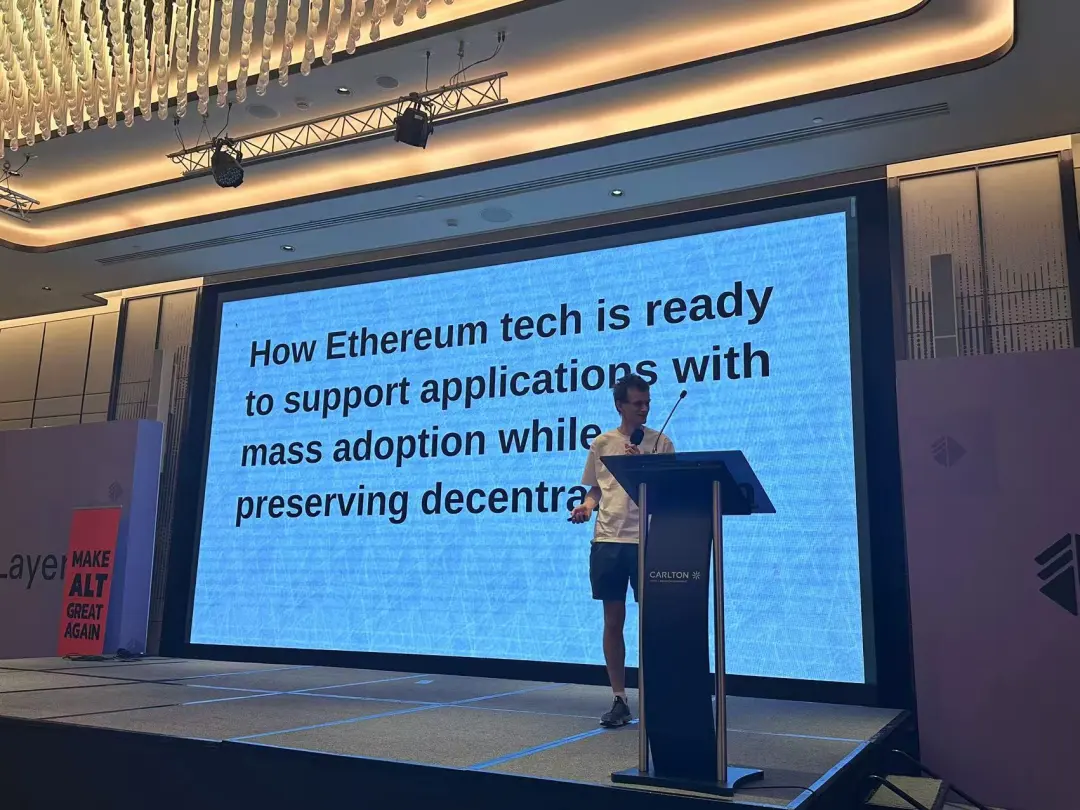-
 PA一线 · 11-22 20:21
ニュースリリース最適化テスト
PA一线 · 11-22 20:21
ニュースリリース最適化テストニュースリリース最適化テストの概要 サマリー
-
 刘正要律师 · 11-22 19:55
多言語記事公開テスト - ワンクリック同期 - 1
刘正要律师 · 11-22 19:55
多言語記事公開テスト - ワンクリック同期 - 1多言語記事公開テスト
-
 欧科云链 · 11-22 14:30
Devcon レビュー | AltLayer_Rollup_Day で 200 人の開発者に会った後の洞察
欧科云链 · 11-22 14:30
Devcon レビュー | AltLayer_Rollup_Day で 200 人の開発者に会った後の洞察OKLink は、好奇心と使命感を持って、先週の Devcon バンコクや周辺イベントで開発者と緊密に対話し、データ インフラストラクチャ ビルダーの観点から皆さんと答えを探してきました。
-
 白话区块链 · 11-22 09:00
詐欺から富へ、ミームコイン市場構造分析
白话区块链 · 11-22 09:00
詐欺から富へ、ミームコイン市場構造分析Memecoin市場に関する徹底した調査を通じて、コミュニティの参加、トークン発行、プラットフォームの使用状況、ユーザーのニーズの現状が分析され、この現象の背後にある社会的動機と将来の可能性が明らかになりました。
 金色财经 · 11-22 08:00
Glassnode: 仮想通貨市場の 629 億ドルの資本流入を主導したのは誰ですか?
金色财经 · 11-22 08:00
Glassnode: 仮想通貨市場の 629 億ドルの資本流入を主導したのは誰ですか?この需要は米国のスポットETFを通じた機関投資家が主導している。
-
 深潮TechFlow · 11-22 07:00
この強気市場では注目がすべてであり、ユニークなストーリーと Z 世代のサポートが鍵となります
深潮TechFlow · 11-22 07:00
この強気市場では注目がすべてであり、ユニークなストーリーと Z 世代のサポートが鍵となります真実は単純です。最良のアイデアが常に勝つとは限りません。重要なのは注目されることです。
-
 PA一线 · 11-22 00:02
Coinbase International StationがCoWプロトコルの無期限先物契約を開始します
PA一线 · 11-22 00:02
Coinbase International StationがCoWプロトコルの無期限先物契約を開始しますCoinbase International Stationが発表しました。
-
 PA一线 · 11-21 23:01
関係者:米国証券取引委員会(SEC)とSOLスポットETFの立ち上げを望む発行会社との間の交渉は「進展」している
PA一线 · 11-21 23:01
関係者:米国証券取引委員会(SEC)とSOLスポットETFの立ち上げを望む発行会社との間の交渉は「進展」している関係者2人によると、米証券取引委員会(SEC)職員とSOLスポットETFの立ち上げを目指す発行会社との間の交渉は「進展」しており、SECは現在S-1申請を処理しているという。両氏は、今後数日中に潜在的な発行体に代わって取引所からETF承認プロセスの次のステップとなる19b4申請書が提出される可能性が「非常に高い」と述べた。
-
 PA一线 · 11-21 22:56
Canaan Technology、優先株発行で3,000万米ドルを調達
PA一线 · 11-21 22:56
Canaan Technology、優先株発行で3,000万米ドルを調達ビットコインマイニングマシンのメーカー、Canaan Inc. (NASDAQ: CAN) は最近、シリーズ A-1 優先株を 1 株あたり 1,000 ドルで機関投資家に最大 30,000 株売却する証券購入契約を締結しました。この協定により、北米におけるデジタルマイニングおよびデジタル機器の開発を支援するために3,000万ドルが調達される予定です。以前、Canaan Technology は 2024 年 9 月にシリーズ A 資金調達を完了しており、その際に最大 125,000 株のシリーズ A 転換優先株を売却しました。
-
 PA一线 · 11-21 22:36
分散型ゲーム プレーヤー ネットワーク KGeN が Aptos Labs 主導で 1,000 万米ドルの資金調達を完了
PA一线 · 11-21 22:36
分散型ゲーム プレーヤー ネットワーク KGeN が Aptos Labs 主導で 1,000 万米ドルの資金調達を完了分散型ゲーム プレーヤー ネットワークである KGaN は、Aptos Labs が主導し、Game7 DAO と Polygon の参加により 1,000 万米ドルの資金調達が完了したことを発表しました。
- 暗号通貨の流動時価総額(7日間)$2,190,813,773,927Market Cap恐怖・貪欲指数(過去30日間)
 PA一线 · 11-21 21:21
ビットコイン採掘会社MARAが10億米ドルの転換社債の発行を完了
PA一线 · 11-21 21:21
ビットコイン採掘会社MARAが10億米ドルの転換社債の発行を完了ビットコイン採掘会社MARA Holdings, Inc.は、購入契約に基づいて最初の購入者に付与された購入オプションに基づいて発行された1億5,000万米ドルを含む10億米ドルの転換社債の発行を完了し、購入オプション期間は同日から開始される。債券の初回発行は 13 日間で、最初の購入者は 2024 年 11 月 19 日に完全に行使され、追加購入は 2024 年 11 月 20 日に完了しました。
-
 DefiLlama 24 · 11-21 21:00
VitaDAOの資金提供プロジェクトへの応用可能性が高い事例の一覧表
DefiLlama 24 · 11-21 21:00
VitaDAOの資金提供プロジェクトへの応用可能性が高い事例の一覧表この記事では、著者の限られた知識ベースと医学的背景に基づいて、VitaDAO の過去のハイライト資金提案の一部を整理します。 AI Steam Labs が開発した AI 検索システム (tokenchat.ai) と組み合わせて知識を拡張します。 VitaDAO が DeSci エコシステムの主導的なプロジェクトである理由を理解し、ライフサイエンスへのこの投資 DAO がどのような疾患分野に関与しているかを理解するのに役立ちます。
-
 PA一线 · 11-21 20:09
Sui ネットワークは回復し、トランザクションを再び処理しています
PA一线 · 11-21 20:09
Sui ネットワークは回復し、トランザクションを再び処理していますSui は、Sui ネットワークが回復し、トランザクションを再び処理していることを示すアップデートを正式にリリースしました。この 2 時間のダウンタイムは、バリデーターのクラッシュを引き起こしたトランザクション スケジュール ロジックのエラーによって引き起こされたものであり、現在は解決されています。
-
 区块律动BlockBeats · 11-21 20:00
憶測の外套を脱ぎ捨てれば、ミームはもはや PVP だけのものではなくなりますか?
区块律动BlockBeats · 11-21 20:00
憶測の外套を脱ぎ捨てれば、ミームはもはや PVP だけのものではなくなりますか?「ミームコインはテストです。ミームコインをジョークや面白い写真だと考えるのは失敗です。ミームコインが止められないトークン化されたコミュニティであることを理解することは、認識することです。」
-
 NingNing · 11-21 19:00
ビットコインは引き続き最高値を更新し、100,000ドルに近づいています。模倣品が大量にある場合はどうすればよいですか?
NingNing · 11-21 19:00
ビットコインは引き続き最高値を更新し、100,000ドルに近づいています。模倣品が大量にある場合はどうすればよいですか?BTCとアルトコイン間のこのデカップリングの期間と範囲は、歴史的な事例をはるかに超えていることを認めざるを得ません。
-
 Gate.io · 11-21 18:57
Gate Group が Gate Crypto Card を発売: EEA 居住者にスムーズなグローバル暗号決済体験を提供
Gate.io · 11-21 18:57
Gate Group が Gate Crypto Card を発売: EEA 居住者にスムーズなグローバル暗号決済体験を提供Gate Group は、欧州経済領域 (EEA) のユーザー向けに仮想通貨から法定通貨への変換プロセスを簡素化するために設計された Visa デビット カードである Gate Crypto Card を発売できることを誇りに思っています。
-
 PA日报 · 11-21 18:36
PA Daily | トランプ陣営、ビットコインが9万7000ドルを突破、史上最高値を更新
PA日报 · 11-21 18:36
PA Daily | トランプ陣営、ビットコインが9万7000ドルを突破、史上最高値を更新MicroStrategyはゼロクーポン転換社債の発行を26億米ドルに増額し、純収益の一部はビットコインの購入に使用される予定。米国でビットコインに直接投資するETFの総資産は1000億米ドルを超える。ダウンしている疑いがあります。 1 数時間ブロックが生成されませんでした。
-
 PA一线 · 11-21 18:18
スイブロックチェーンダウンの疑いあり、1時間ブロック生成なし
PA一线 · 11-21 18:18
スイブロックチェーンダウンの疑いあり、1時間ブロック生成なしSuiscan のデータによると、Sui ブロックチェーンがダウンしている疑いがあり、1 時間ブロックが生成されていません。
-
 项目动态 · 11-21 18:09
DePIN スマートリング Moon Ring ベアチェーンバージョン 2,000 個限定で 11 月 28 日より予約受付開始
项目动态 · 11-21 18:09
DePIN スマートリング Moon Ring ベアチェーンバージョン 2,000 個限定で 11 月 28 日より予約受付開始DePIN の一部として、Moon Ring Bear Chain Special Edition は Bear Chain エコシステムの一部となり、ユーザーにより豊かな参加とインタラクティブなエクスペリエンスをもたらします。
-
 PA一线 · 11-21 18:07
RevolutとLedgerの元幹部が設立した暗号通貨ウォレット、Deblockがシード資金で約1680万ドルを調達
PA一线 · 11-21 18:07
RevolutとLedgerの元幹部が設立した暗号通貨ウォレット、Deblockがシード資金で約1680万ドルを調達英国企業庁に今月提出された文書によると、RevolutとLedgerの元幹部らが設立した暗号通貨ウォレットであるDeblockは、追加のシード資金として1,330万ポンド(約1,680万ドル)を調達した。別の10月の提出書類では、ヘッドライン、ホクストン、20VC、チャルフェンがラウンドの主要投資家であることが示されている。 Siftedは、このスタートアップが昨年密かに1,200万ユーロを調達したと以前に報じた。
続きを読む Dec . 28
Dec.28


































